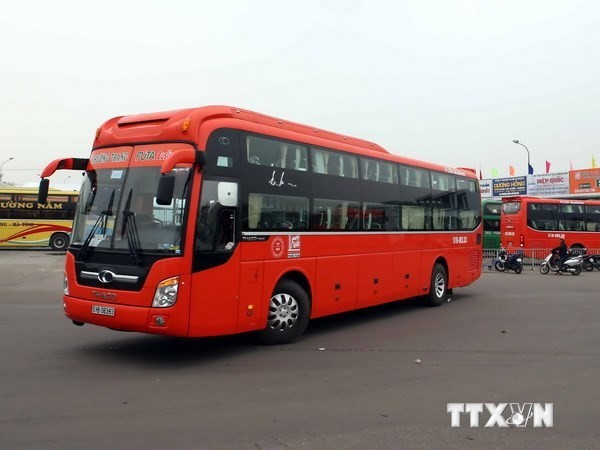The Vietnam Road Administration is conducting nationwide weight checks on sleeper buses to assess technical safety, gather data, analyze findings, and propose traffic safety solutions for these vehicles.
Nationwide Sleeper Bus Weight Checks
The Vietnam Road Administration has instructed local Departments of Transport nationwide to conduct weight checks on a sample of sleeper buses. Each bus will be weighed twice: once without passengers, and once with passengers and their luggage. The checks will continue until October 15th.
 Sleeper bus being weighed to assess safety
Sleeper bus being weighed to assess safety
According to Mr. Nguyen Van Huyen, General Director of the Vietnam Road Administration, this inspection is not intended to penalize overloaded sleeper buses. The primary goal is to collect data for analysis and assess the technical safety condition of these vehicles.
Purpose of Overload Checks on Sleeper Buses
The collected data will help authorities better understand the situation of overloaded sleeper buses, thereby suggesting solutions to improve traffic safety. This is particularly important because there are a significant number of sleeper buses in Vietnam, approximately 4,500 vehicles.
Several provinces and cities are required to inspect 10 to 15 vehicles each, including: Hanoi, Hoa Binh, Son La, Phu Tho, Ha Giang, Quang Ninh, Ninh Binh, Thanh Hoa, Nghe An, Ha Tinh, Thua Thien Hue, Da Nang, Quang Nam, Quang Ngai, Khanh Hoa, Dong Nai, Ho Chi Minh City, Gia Lai, Kon Tum, Dak Lak, Lam Dong, and Phu Yen.
Enhancing Safety for Sleeper Buses
Previously, Deputy Minister of Transport Le Dinh Tho directed that weight checks should be conducted not only on trucks but also on passenger vehicles, especially overloaded sleeper buses. He also expressed concern about the luggage compartments of passenger vehicles, as improper loading can affect vehicle safety.
 Sleeper bus being weighed to assess safety
Sleeper bus being weighed to assess safety
Overloading goods on sleeper buses can be dangerous when the vehicle is cornering or traveling on steep slopes. Sudden shifting of goods can cause the vehicle to lose balance, leading to accidents.
The Ministry of Transport is also considering amending Circular 18 on regulations for organizing and managing passenger transport by automobiles. Some proposals include prohibiting sleeper buses from operating on level 5 and 6 mountainous roads and limiting the speed of these vehicles on mountainous roads with small radius curves. In addition, drivers of sleeper buses must have at least three years of experience driving vehicles with 30 seats or more.
Conclusion
The inspection of overloaded sleeper buses is an important step to ensure traffic safety. The results of the inspection will provide a basis for the Ministry of Transport to propose management and control solutions for this type of vehicle, with the goal of reducing traffic accidents.
